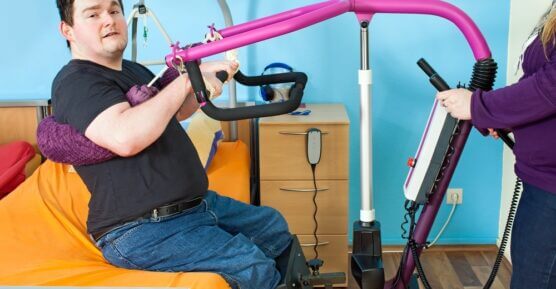
If you have a learning disability, you may be eligible for certain benefits to support you to be as independent as possible and cover extra costs that you have due to your disability.
These benefits can support you financially with participating in work, education or day to day living.
Benefits for learning disabilities
Personal Independence Payment (PIP)
If you are aged between 16 and state pension age, you may be able to receive Personal Independence Payment. This is for people who need extra support to be independent, due to a mental or physical illness or a disability.
PIP is made up of two components. The daily living component is for people who need support with daily tasks, such as washing and dressing, eating and preparing food, communicating and managing their medical needs. The mobility component is for if you have difficulty moving or getting out and about due to a physical or learning disability, mental health issue or sensory impairment.
How much money you receive (paid every 4 weeks) depends on how much support you need. You will be assessed and put into either the lower rate group or the higher rate group.
The current rates for PIP for the 2025/26 tax year are:
Daily living component:
- Lower rate: £73.90
- Higher rate: £110.40
Mobility component
- Lower rate: £29.20
- Higher rate: £77.05
Find out more about PIP eligibility and how to apply.
Disability Living Allowance (DLA)
Disability Living Allowance for adults is being replaced by Personal Independence Payment. You will only continue to receive DLA if you were born on or before 8 April 1948, but the adult scheme is not open to new applicants.
If you have a child with learning disabilities aged 16 or under, you can still apply for DLA.
DLA helps cover the costs of the extra care they need, so how much they receive depends on how much extra support they require.
As with PIP, DLA for children is categorised into two components, one for care and support with day to day living and the other for mobility. You can receive money for both components if both apply.
Rates for Disability Allowance for children 2025/26 (paid every 4 weeks):
Care component:
- Lowest rate: £29.20
- Middle rate: £73.90
- Highest rate: £110.40
Mobility component
- Lower rate: £29.20
- Higher rate: £77.05
At work
Benefits if you have a learning disability and you are working.
Employment and Support Allowance (ESA)
If your learning disability affects how much you can work, ESA can help make up for some lost earnings. You must be under state pension age to claim, and you need to have previously worked and have paid enough National Insurance in the last 2-3 years.
While you are being assessed, you will receive an assessment rate. The assessment period usually lasts 13 weeks. How much your assessment rate is depends on your age.
Weekly ESA assessment rates for 2025/26 (paid fortnightly):
- Aged under 25: up to £72.90
- Aged 25 or over: up to £92.05
After your assessment, you’ll be put in one of two groups, determined by whether you will be able to return to full-time work. If you will, you’ll be put into the work-related activity group, and if you won’t, you’ll be put in the support group.
ESA rates for 2025/26 (paid fortnightly):
- Work-related activity group: £36.55
- Support group: £48.50
The group rate will be paid on top of your regular assessment rate. So if you’re over 25, you’ll receive a total of:
- £128.60 per week if you’re eligible for work-related activity group rates
- £140.55 per week if you’re eligible for support group rates
If you’re in the support group, you may also qualify for a disability premium.
ESA is replacing Incapacity Benefit and Severe Disablement Allowance. More information.
Disability premiums
A disability premium is an extra amount of money added to your Employment Support Allowance or Jobseeker’s Allowance, or as a payment on its own. To qualify, you must either be getting certain benefits, such as DLA, PIP or Attendance Allowance, or have been unable to work for the last year due to a disability.
There are three disability premiums and their rates (per week) for 2025/26 are:
Disability premium
• For a single person: £43.20
• For a couple: £61.65
Enhanced disability premium
• For a single person: £21.20
• For a couple if at least one is eligible: £30.25
Severe disability premium
• For a single person: £82.90
• For a couple if both are eligible: £165.80
Access to Work grant
You have the right to reasonable adjustments to your job role to help overcome anything that you find difficult because of your learning disability. If there is equipment that you need, but your company cannot afford to buy it for you, you may be able to get funding for it from Access to Work. They may also fund a support worker to help you at work or your travel to and from work.
The scheme is available in England, Scotland and Wales.
In education
Benefits if you have a learning disability and are in education.
Disabled Students’ Allowance (DSA)
DSA provides financial and academic support if you attend university or college. What you receive depends on how your learning disability affects your ability to study.
You will have a needs assessment to see what could help you with your studies. Some things you may be offered are:
- Specialist equipment
- A non-medical helper to support you with studying
- Money back on extra costs related to your learning disability
You can find more information about DSA eligibility, what you could receive and how to apply here.
Receiving support from another person
Benefits if you have a learning disability that can go towards getting support.
Attendance Allowance
If your learning disability means that you need somebody to support you with day to day life, you may be eligible for Attendance Allowance to help with this.
There are two rates available for different levels of support needed. If you need help often during the day, or to be supervised during the day or night, you may be eligible for the lower rate. If you need very frequent help, day and night, you may receive the higher rate.
The Attendance Allowance rates for 2025/26 are:
Lower rate: £73.90 per week
Higher rate: £110.40 per week
This is not the same as Constant Attendance Allowance, which is only available to people who are receiving Industrial Injuries Disablement Benefit or War Disablement Pension.
Carer’s Allowance
If somebody close to you supports you for at least 35 hours each week, they could receive Carer’s Allowance. Their support should include daily tasks that you find difficult, such as cooking, cleaning, collecting medication, using transport or personal care.
You also need to not be in full time education or earning over £151 (after tax) a week for somebody to claim Carer’s Allowance for supporting you.
Only one person can claim Carer’s Allowance for looking after you. You also won’t be able to claim a Severe Disability Premium if somebody is claiming Carer’s Allowance for your support.
Carer’s Allowance for the 2025/26 tax year: £83.30 per week.
Funding for a personal assistant
A personal assistant (PA) is somebody who can support you with work, education, leisure and social activities, as well as personal care and help around your home. Your local authority may provide one or more personal assistants for you, or provide funding for you to hire one yourself. You can often use PIP to fund them.
Speak to your local council about your goals and eligibility for a PA or to arrange a needs assessment.
Find your ideal care home
- Explore a wide range of care options and facilities
- Read independent ratings and reviews
- Connect directly with care homes to book a tour and discuss your needs


